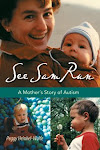(First published 1/24/09)
Sam's social skills have come a long, long way as a young adult. We’ve always known how bright he was. He’s matured into someone who understands the “rules” of adult life and the working world, and often sees emotions with great clarity.
Some slices of life skills we call “social skills” remain stilted. I’ve never been able to quite put my finger on it. After my parents’ 50th anniversary party – epic family gathering that it was – my mom did: “You feel about him like you would a dog.”
It’s a good thing we understand each other, because there could be a terrible subtext with that description.
I happened to be finishing up Gordon Grice’s “The Red Hourglass,” at the same time Mom and I had that conversation. In his book, Grice explores at length this concept of neoteny – the preservation of juvenile characteristics – and how the human and canine relationship could evolve because of that quality. Every domesticated animal has some degree of juvenile characteristics preserved in adulthood … it’s what makes them domesticated.
I felt pretty clueless after I googled “neoteny and autism” and found others in the blogosphere that are considering the concepts directly (neoteny.org). Of course, Temple Grandin has explored human-animal relationships and their implications for all of us.
I do, however, want to offer this to the broader conversation. If neoteny will forever characterize some of his social skill set, and that of other people with autism, that puts a responsibility on the rest of us.
Plenty of folks don’t have a clue how to interact with domesticated animals responsibly.
Yet I’m encouraged, because it's not an unfamiliar responsibility. I don’t have to meet him more than halfway, and no one else has to either.






No comments:
Post a Comment